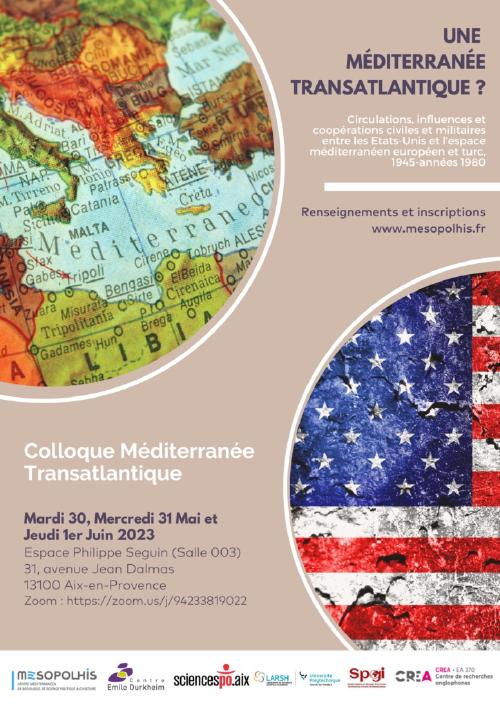- Libellé inconnu,
Colloque international Méditerranée Transatlantique

du 30 mai 2023 au 1 juin 2023
L’objectif de cette rencontre est de contribuer à une histoire transnationale et décloisonnée des circulations entre l'Europe méditerranéenne et les États-Unis entre 1945 et les années 1980, qui permette d’appréhender ces relations d’un point de vue global et d’analyser la façon dont ces liens ont pu aussi générer des circulations d’influence entre pays de la Méditerranée. Il s’agit de conjuguer les approches diplomatiques avec la socio-histoire de ces acteurs et avec l’analyse de la circulation des savoirs et des modes de gouvernementalité, en replaçant les enjeux et politiques militaires atlantiques dans le contexte plus large de mobilités intellectuelles et de pratiques croisées. La Méditerranée européenne et turque est ici entendue dans une acceptation large et politique, allant du Portugal aux confins de la péninsule anatolienne. De même, l’ambition est de voir comment ces relations entre l’Europe méditerranéenne et l’espace atlantique ont pu avoir des effets sur les rives sud et orientales de la Méditerranée, que ce soit pendant ou après la période de domination coloniale.
Programme
- Tuesday 30 May
-
From war to reconstruction
13h00
Reception of the participants
13h30-14h00
Introduction
Nicolas Badalassi et François Dumasy
14h00-16h00
The beginnings of American engagement between war and political influence
Andrew Novo (National Defense University, Washington DC)
When Less is More: American participation in the Greek Civil War.
Evanthis Hatzivassiliou (University of Athens, Hellenic Parliament Foundation for Parliamentarism and Democracy)
Becoming Southern European: Cold War modernization, US models and European inputs in early post-civil war Greece.
Giacomo Canepa (Scuola Normale superiore - Université Franco-italienne)
Le New Deal entre récit politique et modèle de politique publique. L’Italie et les circulations transnationales du modèle américain de sécurité sociale (1944-1950).
François Dumasy (ScPo Aix, Mesopolhis)
Politiques familiales et assistance à l'enfance dans l'aide américaine à l'Italie. La circulation de modèles sociétaux comme enjeu géopolitique
Pause café
16h30-18h00
Americanisation": Encounters and popular culture
Giulia Crisanti (University of Gastronomic Sciences, Pollenzo)
“Bridges Built on Cases of Coke:” France, Italy and the Different Mediterranean Trajectories of the Postwar Coca- colonization of Europe, 1943-1972.
Nathalie Ubéda (Côte d’Azur University)
Les Américains et la Côte d’Azur : entre politique d’influence et coopérations (1945-années 80). Une multiplicité d’acteurs et de logiques au service de la consolidation du « bloc occidental ».
18h00-19h00
Conference of Effie Pedaliu (King’s College, London; London School of Economic and Political Sciences)
The Mediterranean Cold War Laboratory and the Partial Invention of Southern Europe - Wednesday 31 May
-
Consolidation and diversification of US influence
9h00-10h30
Military actors and Atlantic diplomacy from the Cold War to the Détente
Jacopo Lorenzini (University of Macerata)
«Ufficiali integrati». The Italian military and the Atlantic framework, 1949-1969.
Asensio Robles Lopez (European University Institute)
Winning their hearts and minds. US public diplomacy, the Spanish military, and the risks of a Southern European détente, 1976-1982.
Nicolas Badalassi (ScPo Aix, Mesopolhis)
Le partage des tâches franco-américain face aux crises sud-européennes des années 1970 : la construction d'une expertise commune de la sécurité en Méditerranée.
Pause café
11h00-12h30
US diplomacy and European diplomacy outside NATO and the EEC
Lorenzo Delgado Gomez-Escalonilla (History Institute, Centro de ciencias humanas y sociales)
La diplomatie publique occidentale envers l’Espagne franquiste.
Benedetto Zaccaria (University of Padova)
Yugoslav-US relations, Non-Alignment and the Mediterranean balance during the 1970s.
Pierre Bouillon (Lycée du Grandchamp, CPEG)
De l’Atlantique à la Mer Noire, la Méditerranée comme trait d’union ? Les relations France-Italie-Roumanie à l’aune de la Détente et de la mondialisation américaine.
14h00-15h30
Pathways to science diplomacy and cooperation
Sarah Snyder (School of International Service, American University, Washington DC)
American Expatriate Colonies in a Transatlantic Mediterranean.
Oscar J. Martin Garcia (CSIC-Univeristat Politècnica de València)
The Fulbright Program in Franco’s Spain. Strategic Interests, Cultural Relations and Transnational Networks.
Danilo Delle Fave (International Team for the Study of Security, Verona)
Euro-Atlantic aerospace cooperation with Turkey: from AGARD’s foundation to the creation of a national aerospace industry
Pause café
16h00-17h00
Transitions & democratizations
Ayşegül Sever (Marmara University)
Turkey’s Human Rights Performance vis-à-vis the Cold War Human Rights Agenda.
Carlos Sanz Diaz (Complutense University of Madrid) & Antonio Moreno Juste (Complutense University of Madrid)
American-style Europeanization. American formation and influences in the Europeanizing ministerial and civil servant elites of the Spanish socialist governments of the Cold War, 1982-1989. - Thursday 1 June
-
Reformulations and contestations. The role of the European lefts
9h00-11h30
Reformulations and contestations. The role of the European lefts.
Nicola Lamri (Université Polytechnique Hauts-de-France, LARSH)
La Confédération générale italienne du travail (CGIL) face aux syndicats états-uniens pendant la guerre de décolonisation algérienne. Une forme de compétition entre réseaux d’influence non-étatiques en Méditerranée ? (1956-1965).
Martina Marchesi (Scuola Normale Superiore, Pisa)
Italian Perspectives on the North-South Conflict: the Italian political cultures and the New International Economic Order.
Michele Di Donato (University of Pisa)
Southern European Crossroads: Transnational Socialist Diplomacy and the Transformation of the Transatlantic Partnership in the 1970s.
Ana Monica Fonseca (CEI-Iscte, Iscte-University Institute of Lisbon)
Carnations between Bonn and Washington. How the Portuguese revolution affected the transatlantic relations in mid-1970s.
Pause café
12h00-13h00
Discussion & conclusions
Frédéric Attal (Université Polytechnique Hauts-de-France, LARSH, Institut Sociétés et Humanités)
Le programme au format PDF : https://mesopolhis.fr/wp-content/uploads/2023/05/Colloque-Mediterranee-Transatlantique-8.pdf
- Laboratoire Mesopolhis
- Sciences Po Aix
- Centre Emile Durkheim
- CREA
- LARSH
- François Dumasy, ScPo Aix, Mesopolhis
- Nicolas Badalassi, ScPo Aix, Mesopolhis
- Frédéric Attal, Université Polytechnique Hauts-de-France, LARSH
- Elena Calandri, Università di Padova, SPGI
- Frédéric Heurtebize, Université Paris Nanterre, CREA
- Matthieu Trouvé, ScPO Bordeaux, Centre Émile Durkheim
Mis à jour le 28 mai 2023












